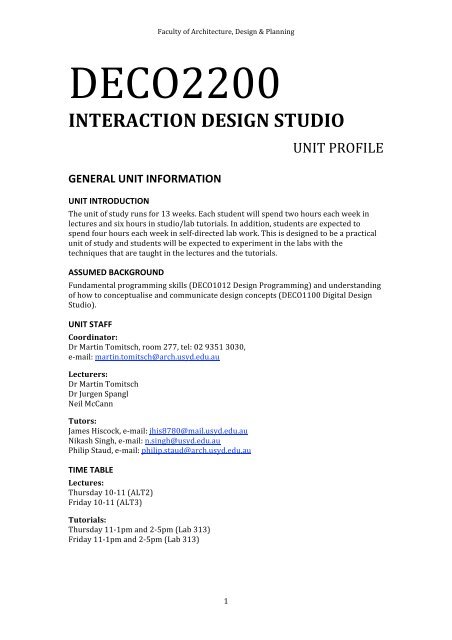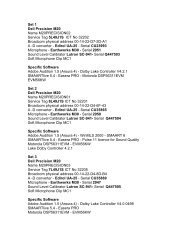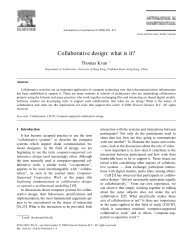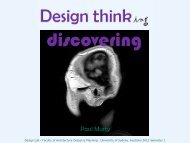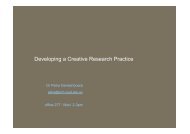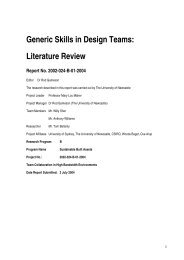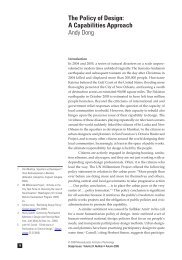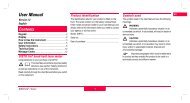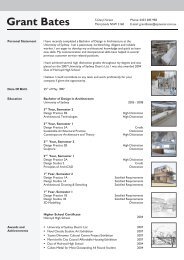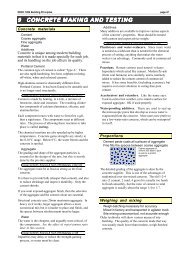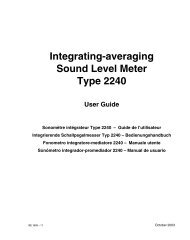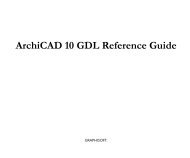DECO2200 profile - Martin Tomitsch - The University of Sydney
DECO2200 profile - Martin Tomitsch - The University of Sydney
DECO2200 profile - Martin Tomitsch - The University of Sydney
You also want an ePaper? Increase the reach of your titles
YUMPU automatically turns print PDFs into web optimized ePapers that Google loves.
Faculty <strong>of</strong> Architecture, Design & Planning<br />
<strong>DECO2200</strong><br />
INTERACTION DESIGN STUDIO<br />
GENERAL UNIT INFORMATION<br />
UNIT INTRODUCTION<br />
UNIT PROFILE<br />
<strong>The</strong> unit <strong>of</strong> study runs for 13 weeks. Each student will spend two hours each week in<br />
lectures and six hours in studio/lab tutorials. In addition, students are expected to<br />
spend four hours each week in self‐directed lab work. This is designed to be a practical<br />
unit <strong>of</strong> study and students will be expected to experiment in the labs with the<br />
techniques that are taught in the lectures and the tutorials.<br />
ASSUMED BACKGROUND<br />
Fundamental programming skills (DECO1012 Design Programming) and understanding<br />
<strong>of</strong> how to conceptualise and communicate design concepts (DECO1100 Digital Design<br />
Studio).<br />
UNIT STAFF<br />
Coordinator:<br />
Dr <strong>Martin</strong> <strong>Tomitsch</strong>, room 277, tel: 02 9351 3030,<br />
e‐mail: martin.tomitsch@arch.usyd.edu.au<br />
Lecturers:<br />
Dr <strong>Martin</strong> <strong>Tomitsch</strong><br />
Dr Jurgen Spangl<br />
Neil McCann<br />
Tutors:<br />
James Hiscock, e‐mail: jhis8780@mail.usyd.edu.au<br />
Nikash Singh, e‐mail: n.singh@usyd.edu.au<br />
Philip Staud, e‐mail: philip.staud@arch.usyd.edu.au<br />
TIME TABLE<br />
Lectures:<br />
Thursday 10‐11 (ALT2)<br />
Friday 10‐11 (ALT3)<br />
Tutorials:<br />
Thursday 11‐1pm and 2‐5pm (Lab 313)<br />
Friday 11‐1pm and 2‐5pm (Lab 313)<br />
1
Faculty <strong>of</strong> Architecture, Design & Planning<br />
AIMS AND OBJECTIVES<br />
UNIT AIMS<br />
<strong>The</strong> aim <strong>of</strong> this unit <strong>of</strong> study is to introduce students to the issues involved in the design<br />
<strong>of</strong> interactive systems. This unit <strong>of</strong> study will focus on best practice in interaction design<br />
including the use <strong>of</strong> requirement analysis, prototype development, and user evaluation.<br />
In addition, students will learn practical skills in web design including how to use core<br />
technologies (e.g. HTML, CSS and JavaScript) and how to use common web development<br />
tools (e.g. Dreamweaver).<br />
UNIT OBJECTIVES<br />
On completion <strong>of</strong> this unit <strong>of</strong> study, students should be able to:<br />
• assess the requirements <strong>of</strong> an interaction design problem.<br />
• assess the structural and navigational requirements <strong>of</strong> web sites.<br />
• prototype, develop and document designs that require interaction.<br />
• design and develop web sites using modern web design techniques.<br />
• evaluate the performance <strong>of</strong> a design against usability goals.<br />
LEARNING RESOURCES<br />
RECOMMENDED BOOKS<br />
Rogers, Y., Sharp, H. & Preece, J. (2007) Interaction design: Beyond human‐computer<br />
interaction, 2nd edition, New York: Wiley.<br />
Saffer, D. (2009) Designing for Interaction: Creating Smart Applications and Clever<br />
Devices, 2nd edition, New Riders Press.<br />
Buxton, B. (2007) Sketching User Experiences: Getting the Design Right and the Right<br />
Design, Morgan Kaufmann.<br />
Cooper, A. (2007) About Face 3: <strong>The</strong> Essentials <strong>of</strong> Interaction Design, 3rd edition, Wiley.<br />
Krug, S. (2005) Don't Make Me Think: A Common Sense Approach to Web Usability, 2nd<br />
edition, New Riders Press.<br />
Kuniavsky, M. (2003) Observing the User Experience: A Practitioner's Guide to User<br />
Research, Morgan Kaufmann.<br />
Selected chapters are available through the Library UoS reserve.<br />
ONLINE RESOURCES<br />
Interaction Design Association (IxDA) http://www.ixda.org/<br />
Mozilla Labs Blog http://labs.mozilla.com/blog/<br />
ACM portal http://portal.acm.org/<br />
See Unit website for further resources.<br />
2
Faculty <strong>of</strong> Architecture, Design & Planning<br />
ASSESSMENT<br />
ASSESSMENT SUMMARY & GRADING<br />
• Participation (10%)<br />
This portion reflects the involvement <strong>of</strong> students in the unit, which includes: class<br />
attendance, engagement and questions asked during the classes and tutorials, active<br />
participation on the unit network (blog posts and comments).<br />
• Tutorial activities (20%)<br />
Small activities will be carried out during tutorials (1% each). <strong>The</strong>y are designed to<br />
help students understand the key issues <strong>of</strong> this unit and to support the assignment<br />
tasks.<br />
• Assignment 1: individual project (10%)<br />
<strong>The</strong> first assignment is organised as an individual assignment, i.e. each student has<br />
to develop and submit a solution for a specific domain. This includes implementing a<br />
low‐fidelity prototype using HTML and CSS.<br />
<strong>The</strong> assignment will be assessed according to methodological approach, design<br />
(navigation, interaction, etc.), and execution (implementation).<br />
• Assignment 2: group project (60%)<br />
This assignment is divided into the following subtasks: collecting user requirements<br />
and developing a concept (assignment 2a, 10%, individual), creating a paper<br />
prototype and user testing (assignment 2b, 10%, group), implementing the interface<br />
(client‐side) and the backend (server‐side) for the application (assignment 2c, 20%,<br />
group). <strong>The</strong> final concept has to be documented through a blog post and video<br />
submission (assignment 2d, 10%, group) and presented in class (final presentation,<br />
10%, group).<br />
For the group parts <strong>of</strong> this assignment students have to form groups <strong>of</strong> two.<br />
<strong>The</strong> assignment will be assessed according to methodological approach,<br />
interpretation <strong>of</strong> results, design (navigation, interaction, etc.), innovation, and<br />
execution. <strong>The</strong> final presentation will be assessed according to presentation quality<br />
(slide design, style, clarity, engagement, etc.) and presentation content (material,<br />
background, originality, sophistication, etc.).<br />
Further details about the design briefs and assessment will be handed out in class.<br />
LATE SUBMISSIONS<br />
According to the faculty policies work submitted after the deadline but up to 3 days (72<br />
hours) late can achieve a maximum <strong>of</strong> 65% <strong>of</strong> marks allocated for the assessment task<br />
(low Credit).<br />
Work submitted after 3 days (72 hours+) but up to 1 week late (same deadline time and<br />
day one week later) can achieve a maximum <strong>of</strong> 50% <strong>of</strong> marks allocated for the<br />
assessment task (minimum Pass).<br />
3
Faculty <strong>of</strong> Architecture, Design & Planning<br />
Work submitted more than 1 week late (after deadline time and day one week later) but<br />
less than 2 weeks late can achieve a maximum <strong>of</strong> 45% <strong>of</strong> marks allocated for the<br />
assessment task (Fail).<br />
Work submitted more than 2 weeks late (after deadline time and day two weeks later)<br />
will not be assessed (Absent Fail).<br />
See the faculty website for more information:<br />
http://www.arch.usyd.edu.au/CS/undergrad/late_submit.shtml<br />
ASSESSMENT DETAILS<br />
Lodgement<br />
All assignments have to be submitted either as report (PDF document) or blog post on<br />
the unit website and sent by e‐mail to the unit e‐mail address.<br />
Outcomes <strong>of</strong> assessment exercises<br />
<strong>The</strong> following standards will be applied to the grading <strong>of</strong> work. Each passing grade<br />
subsumes and goes beyond the grads lower than it.<br />
High Distinction: Outstanding understanding <strong>of</strong> unit material, original thinking, high<br />
level <strong>of</strong> contribution to critical discussion, complete resolution <strong>of</strong> tasks,<br />
excellent quality <strong>of</strong> deliverables. Mark 85‐100%<br />
Distinction: Thorough understanding <strong>of</strong> unit material, medium level <strong>of</strong> contribution to<br />
critical discussion, complete resolution <strong>of</strong> tasks, accomplished quality <strong>of</strong><br />
deliverables. Mark 75‐84%<br />
Credit: Thorough understanding <strong>of</strong> unit material, adequate level <strong>of</strong> contribution to<br />
critical discussion, complete resolution <strong>of</strong> tasks, average quality <strong>of</strong> deliverables.<br />
Mark 65‐74%<br />
Pass: Satisfies some <strong>of</strong> the basic learning requirements <strong>of</strong> the unit. Assignment<br />
resolution satisfies all fundamental requirements and demonstrates<br />
competence against all assessment criteria. Mark 50‐64%<br />
Fail: Falls short <strong>of</strong> satisfying all basic requirements for a pass. Mark 45‐49%<br />
Fail: Fails to satisfy some <strong>of</strong> the basic requirements <strong>of</strong> the unit. Incomplete or<br />
inadequate resolution <strong>of</strong> assignments. Mark 25‐44%.<br />
Fail: Fails most or all <strong>of</strong> the basic requirements <strong>of</strong> the unit. Incomplete or inadequate<br />
resolution <strong>of</strong> assignments. Mark 0‐24%<br />
POLICY<br />
You are advised to carefully read and follow the faculty policies available from here:<br />
http://www.usyd.edu.au/handbooks/architecture/03_FacultyPolicies.shtml<br />
Specifically the following policies apply for this unit <strong>of</strong> study:<br />
ATTENDANCE<br />
Faculty policies apply in regards to lecture and tutorial attendance. This means that<br />
students must attend all lectures and tutorials required for this unit <strong>of</strong> study. Missing<br />
more than one class (ie lecture and tutorial), without certification for illness or<br />
4
Faculty <strong>of</strong> Architecture, Design & Planning<br />
misadventure, will affect the student’s final mark. Students missing more than three<br />
classes might fail the unit.<br />
ASSESSMENT RELATED POLICIES AND GUIDELINES<br />
An overview <strong>of</strong> the <strong>University</strong>’s assessment‐related policies can be found in the Faculty<br />
Handbook.<br />
Academic Integrity & Plagiarism<br />
It is the <strong>University</strong>’s task to encourage ethical scholarship and to inform students and<br />
staff about the institutional standards <strong>of</strong> academic behaviour expected <strong>of</strong> them in<br />
learning, teaching and research. Students have a responsibility to maintain the highest<br />
standards <strong>of</strong> academic integrity in their work. Students must not cheat in examinations<br />
or other forms <strong>of</strong> assessment and must ensure they do not plagiarize. <strong>The</strong> <strong>University</strong> has<br />
adopted the following definition <strong>of</strong> plagiarism:<br />
Plagiarism is the act <strong>of</strong> misrepresenting as one’s own original work, the ideas,<br />
interpretations, words or creative works <strong>of</strong> another. <strong>The</strong>se include published and<br />
unpublished documents, designs, music, sounds, images, photographs, computer codes<br />
and ideas gained through working in a group. <strong>The</strong>se ideas, interpretations, words or<br />
works may be found in print and/or electronic media. <strong>The</strong> following are examples <strong>of</strong><br />
plagiarism where appropriate acknowledgement or referencing <strong>of</strong> the author or source<br />
does not occur:<br />
• Direct copying <strong>of</strong> paragraphs, sentences, a single sentence or significant parts <strong>of</strong> a<br />
sentence without quotation marks around the copied text and not referencing the<br />
source;<br />
• Copying ideas, concepts, research results, computer codes, statistical tables, designs,<br />
images, sounds or text or any combination <strong>of</strong> these;<br />
• Paraphrasing, summarising or simply rearranging another person's words, ideas, etc<br />
without changing the basic structure and/or meaning <strong>of</strong> the text;<br />
• Offering an idea or interpretation that is not one's own without identifying whose<br />
idea or interpretation it is;<br />
• A ‘cut and paste' <strong>of</strong> statements from multiple sources;<br />
• Presenting as independent, work done in collaboration with others;<br />
• Copying or adapting another student's original work into a submitted assessment<br />
item.<br />
Academic honesty is a core value <strong>of</strong> the <strong>University</strong> <strong>of</strong> <strong>Sydney</strong>. <strong>The</strong> <strong>University</strong> is<br />
committed to the basic academic right that students receive due credit for work<br />
submitted for assessment. Integral to this is the notion that is clearly unfair for students<br />
to submit work for assessment that is not their own and that is not attributed to the<br />
original authors. This is known as plagiarism. Such activity represents a form <strong>of</strong> fraud.<br />
<strong>The</strong> academic Board Resolution on ‘Academic Honesty in Coursework’ sets out<br />
principles, procedures and a code <strong>of</strong> practice for academic honesty in submitted work in<br />
the <strong>University</strong>.<br />
<strong>The</strong> <strong>University</strong> policy for plagiarism is available online:<br />
http://www.usyd.edu.au/senate/policies/Plagiarism.pdf<br />
5
Faculty <strong>of</strong> Architecture, Design & Planning<br />
Students who are found to have plagiarised face a range <strong>of</strong> penalties from warning,<br />
failure <strong>of</strong> the unit <strong>of</strong> study <strong>of</strong> disciplinary action under the <strong>University</strong> by‐laws. <strong>The</strong><br />
Faculty <strong>of</strong> Architecture, design and Planning takes plagiarism very seriously.<br />
Feedback on Assessment<br />
For a detailed explanation <strong>of</strong> the feedback you are entitled to, you should consult the<br />
policy on Student Access to Feedback on Assessment. As a student you have a<br />
responsibility to incorporate feedback into your learning; make use <strong>of</strong> the assessment<br />
criteria that you are given; be aware <strong>of</strong> the rules, policies and other documents related<br />
to assessment; and provide teachers with feedback on their assessment practices. <strong>The</strong>re<br />
are certain steps you can take if you feel your result does not reflect your performance.<br />
Please refer to the Faculty Handbook.<br />
OTHER POLICIES AND GUIDELINES<br />
Students with Disability<br />
Any student with a disability who may require alternative academic arrangements,<br />
including assessment, in course/program is encouraged to seek advice at the<br />
commencement <strong>of</strong> the semester from the Faculty. Where an adjustment is made to an<br />
accredited program, it is the responsibility <strong>of</strong> the relevant Faculty to liaise with<br />
pr<strong>of</strong>essional and registration bodies regarding the acceptability <strong>of</strong> the change/s.<br />
Occupational Health and Safety<br />
Undergraduate Students and Postgraduate Students should be familiar with the<br />
<strong>University</strong> policies on occupational health and safety in the laboratory.<br />
Other Faculty Guidelines<br />
For safety reasons, full access to all construction sites may not be possible for students<br />
with disabilities, and alternative arrangements may need to be made for the associated<br />
assessment tasks. Any student with a disability who may require alternative<br />
arrangements is encouraged to seek advice at the commencement <strong>of</strong> the semester from<br />
a Disability Adviser at Student Support Services and to consult the course coordinator.<br />
6


